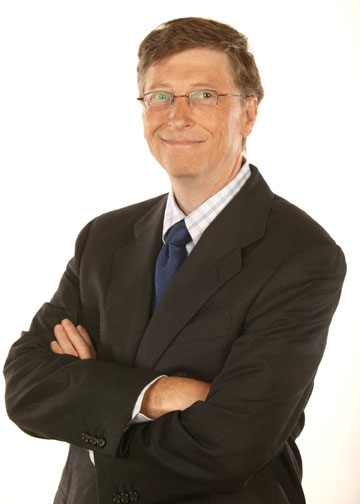 |
| William Henry Gates III (www.microsoft.com/.../execs/web/billg1_web.jpg) |
Only a minimum amount of beading sweat and greased hair was involved. It was the very first microcomputer ever introduced to America, and one bright, young genius had nailed an interpretation of the phenomena through BASIC in one single amazing attempt. The flawless execution of the program in front of awed witnesses proved it all. Not only had this intelligent “tech whiz” pulled off such an astonishing moment that captured and struck his curious bystanders with blank stares, but it was just the beginning of his dominance and influence in the computer industry. He is the one and only Bill Gates. Rarely has anyone in the entire world, other than Gates, has the right to declare themselves a billionaire by the age of 36. William Henry Gates III is a cofounder of Microsoft Corporation, one of the largest companies in the world. Ever since he was in 7th grade at Seattle’s Lakeside School, Bill Gates had ascertained a gift and interest for computer science. Today, he is ranked as the richest man in the world and is globally known for developing efficient software for computers. Because of his broad creativity and generous dedication to society, he can be considered one of the greatest heroes and geniuses of our time. Deserving heroes put the needs of others before their own and ask for nothing in return. Their impact on society is sensational and embedded in our minds. Bill Gates vibrantly demonstrates these traits through his courteous benevolence and significant contributions to the world. Bill Gates’ inventions of the Microsoft and Windows operating systems led a revolution that brought computers worldwide attention and gave computers greater versatility for people to use. Also a committed philanthropist, Bill Gates exemplifies his great regard for the welfare of future generations through his huge donations for global healthcare and education.
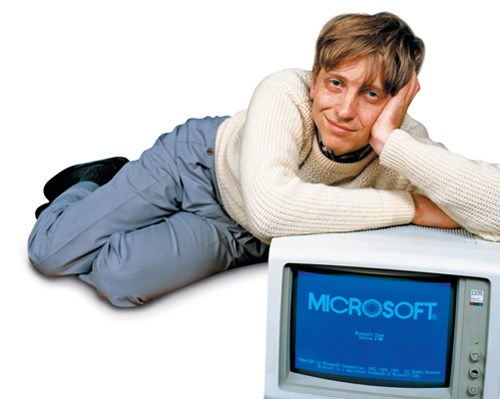 |
| Bill Gates posing with his brilliant MS-DOS (http://images.businessweek.com/ss/06/08/personalbest_timeline/image/bill_gates.jpg) |
Bill Gates began a revolution in technology that will live on for generations to come. When the first microcomputer the Altair was introduced, Gates immediately received a compelling conviction to develop new software for computers. Believing that computers were the next essential products of the future, Bill Gates knew that a field of work in the software industry was where he wanted to be to plant his legacy and success. In 1975, Bill Gates dropped out of Harvard University to start pursuing a serious business career in software design (UXL Encyclopedia of World Biography). Quitting from a top university conveyed that Bill Gates had higher hopes in making revolutionary software than his education in law. By deciding to give up his exemplary education, Bill Gates emphasizes the importance of chasing after your true interests. Nevertheless, he also shows his fastidious wit in the art of business by beginning to compute software before many other software developers could contribute their own improvements. Also, later on in the future, his big decision clearly paid off. “In 1980, Bill Gates’ company Microsoft Corporation was chosen by IBM to develop the operating system for its first personal computer” (Ferrell). Bill Gates wrote the Microsoft disk operating system for IBM which proved to be so efficient that it sold millions of copies to IBM and even coaxed IBM to publicize its personal computer for more changes. The Microsoft disk operating system MS-DOS had not only been a wonderful beginning of success for Bill Gates but had also significantly improved the capabilities of the computer. By making a computer’s functions easier to operate, the operating system comprises and influences a huge component of the advanced computers we have today. Amazed by Bill Gates’ operating system, “software developers, quickly moved to become compatible with IBM” (UXL Encyclopedia of World Biography). This proved Bill Gates’ contribution to IBM a success and revolution in the computer industry. The MS-DOS had not only become the standard of future software but had also inspired many software developers. “By late 1996, over 90 percent of all PCs had a Microsoft operating system” (DISCovering Biography). The Microsoft operating system had become a universal trend and had changed the world’s use of computers for the better. Today, Bill Gates’ software continues to inspire great advancements in technology.
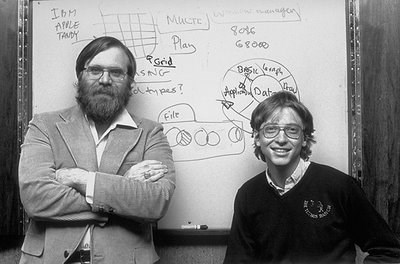 |
| Microsoft cofounders Bill Gates and Paul Allen (http://very-bored.com/pics2/youngbillgates/young-bill-gates-4.jpg) |
Bill Gates’ innovations that brought him early success influence many to not delay and forfeit their aspirations. “Bill Gates set up his first software company at age 15 with a schoolmate named Paul Allen” (Ferrell). Starting a company and honing his computer skills at such a young age displays Bill Gates’ persistent drive to success. Bill Gates did not wait or delay to start pursuing his desired career but began sharpening his skills as soon as he could. With many years ahead of him, he learned how to run a company and make unique software at a very young age. Bill Gates’ early accomplishments with business and computers encourage many people to not consider their age as a hindrance in reaching toward their dreams. His success also inspires people to be more open with their creative ideas and persevere to make their ideas reality. Speaking of Bill Gates’ early experiences, “in 1975, Bill Gates and Paul Allen began to design programs for PC’s, which had just entered the marketplace” (Ferrell). Bill Gates presents himself as a wise opportunist and businessman by beginning to develop software the moment when personal computers were first released. His hastiness to start planning adaptable features for the computer not only shows his eagerness to advance computers but also expresses the great opportunity, that upgrading computers from its lowly advanced state would prove to be a great source of success. Bill Gates was certainly correct in believing that enhancing computers from its fundamental condition would promise a good future. His first contribution for personal computers was the Microsoft disk operating system produced for IBM’s first personal computer codenamed Project Chess. This helped organize and simplify the operations that control the computer’s functions so that performing activities on the computer would not be so tedious and complicated. The software he made after the MS-DOS was a more improved version, famously known today as the Windows operating system. Both operating systems proved to be a great, lucrative success for Bill Gates with both selling millions of copies around the world and counting. Bill Gates’ road to success had been a long yet inspiring one that required much persistence, decisions, and experience. Although he had put many hours of time and commitment into his work, his success had paid off and flourished at a very young time of his life. Bill Gates edifies many young men and women to value their time, spend their time efficiently, and persevere toward success.
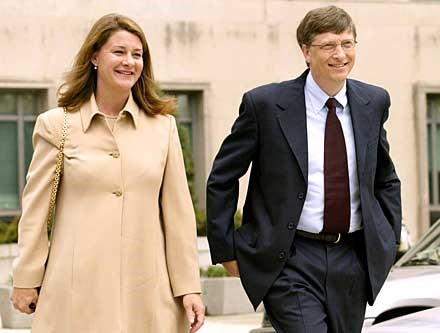 |
| Bill and Melinda Gates (http://arkjournal.com/uploaded_images/Melinda-Gates-726943.jpg) |
Not only had Bill Gates made significant contributions to computers, but he is also highly known for his efforts in philanthropy which express his strong dedication and support to society. The Bill and Melinda Gates Foundation, an organization for charity established by Bill Gates and his wife Melinda Gates “has donated more than $4 billion since its start in 1996” (UXL Encyclopedia of World Biography). Establishing his very own foundation for charity conveys the moral importance Bill Gates holds upon spending money for those in need, let alone donating such a large portion of his money. Bill Gates confides his standards in us that spending money to improve other lives is meaningful and effective. “Recent pledges from the Bill and Melinda Gates Foundation include $1 billion over twenty years to fund college scholarships for minority students” (UXL Encyclopedia of World Biography). Through his support for minority students, Bill Gates demonstrates his equal treatment and respect for everyone, despite their cultural differences. He spends a great amount of his money from hard work in order to provide equal opportunities for everyone, especially for those who are often unfortunate, unnoticed, or underestimated. Another influential characteristic of philanthropy that Bill Gates portrays is commitment. “In June of 2008, Gates was ready to devote his full-time energy to matters of philanthropy” (Rosen). Bill Gates displays virtue by showing that he is not the typical, rich man who hungers for money and fame. Instead, once he could adequately support himself and reach satisfaction with his money, he chose to resign from his job to spend his earnings for those in need. As the richest man in the world and the owner of a globally renowned company, many people admire and look up to Bill Gates. Bill Gates’ financial support for the needy makes him a heroic role model of how one should effectively utilize their money for society and not excessively for themselves.
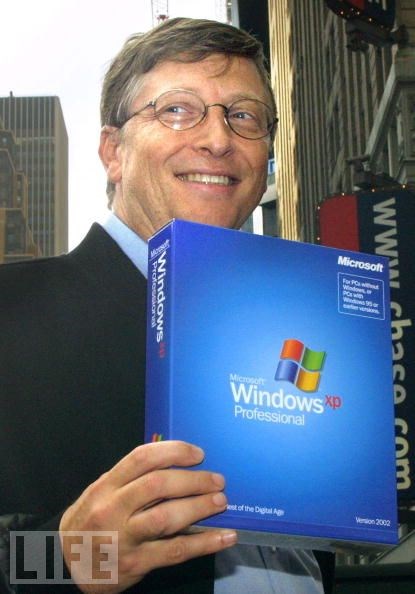 |
| Bill Gates flaunting Windows XP (http://cache1.asset-cache.net/xc/1169554.jpg) |
Bill Gates is worthy to be proud of many accomplishments he had imbued in history. He had produced highly efficient operating systems that had advanced computers and put them into critical global focus. His operating systems are used by over 90 percent of manufactured computers today which clearly defines his success and influence in the computer industry. Moreover, he is well known for his acts of philanthropy and generous donations to support healthcare and education around the world. His road to success starting from the humble beginnings of high school is an inspiration to young men and women everywhere. Bill Gates continues to contribute to the world today by spending a great deal of his money to provide for the less fortunate. As the richest man in the world, Bill Gates sets a moral example to all people of how a person should strive to success and affect the world in a poignant way. Bill Gates’ phenomenal contribution of the operating system and high regard for society truly earns him the honorable title of a hero in world history.
Page created on 5/16/2010 12:00:00 AM
Last edited 5/16/2010 12:00:00 AM
